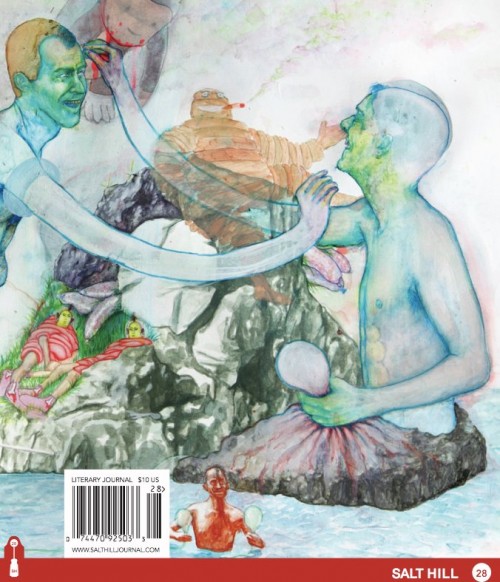Literary Magazine Club
{LMC}: “Foreign Wedding” by Maile Chapman
It’s all these damn faces. They’re all over issue 28 of Salt Hill, and I can’t get them out of my mind. Frederik Heyman’s watercolors and pencils grace both the cover and an inside portfolio—faces in profile, faces looking at the reader, ghostly watercolored faces looking at each other. Then on page one, before the title of the journal or the table of contents or anything else, we’re confronted with the first of Andrew Jilka’s many pencil drawings. The Jilka drawings resonate. They’re layered and repeated, almost like a collage, close-up drawings of faces twisted in ecstasy and reproduced over and over—each time the same face, yet each slightly different. Mouth wide, eyes screwed shut or gaping. The Jilka drawings are meant to be sexual, reverent, and horrifying.
How fitting then to find Maile Chapman’s wondrous short story “Foreign Wedding,” where looking at other people, faces thrust together, examining each other’s movement and motivations, figures so heavily.
The nameless narrator is an American woman attending a wedding in Aix. As she says “it’s hard to have confidence about pronouncing the name at first. But people who’ve been there say it easily: Aches.” Still reeling from her recent divorce, the woman feels fragile and lost. She’s an outsider both literally, she doesn’t seem to know anyone else at the wedding, and only barely knows the bride, but also emotionally: “Of course I’m tired of feeling like this. Of course I would rather feel normal. But really, nothing seems to help.”
In the hands of a lesser author the narrator’s depression and isolation would grow tedious, but Chapman renders her character’s interiority so well that we remain intrigued by the woman and wonder if she’ll find any measure of happiness on this misguided vacation.
The woman is such an outsider that all she can do is look at other people. All she does is look, and it’s almost as if she’s not really there: “Later, when I looked at the photos online after the bride sent around the links, I didn’t see myself anywhere, in any of them.”
She watches old women watch the wedding procession, she watches guests at a party and tenses when she feels them glancing over at her. These glances solidify into an encounter with a Frenchmen, at least ten years younger than the narrator, who notices her staring at him.
Her relationship with the Frenchmen forms the heart of the story. When they look at each other, she’s convinced that she knows him: “His eyes were tired in the way of a person who doesn’t acknowledge his own tiredness, even to himself.”
“Foreign Wedding” is about seeing, understanding, and reading people. She can tell the groom is nice by looking at him, she can tell the man is decent by the way he looks at her during her panic. But this same examination is what she’s afraid of. When she invites the man into her room she can’t face him: “I turned my head because I didn’t want to be looked at, and I didn’t want to be kissed, and if he thought this was strange, at least I didn’t have to see that in his face.”
She doesn’t want to be examined, eyeballed, read, or understood. The woman spends the rest of the story trying to escape the man’s gaze and failing to do so. She sneaks out of the hotel but accidentally jumps into his car. The man follows her when she rents a car and drives out of town. Trying to lose him on the road just makes the man think she’s playing a game, teasing him.
The weight of eyes threatens to crumble her psyche. Try as she might to escape being looked at, being understood, she can’t do it. The story ends with a jolting bit of violence that hinges around someone looking at her and paying a price. It’s tragic. Yet the final image of the story is of another woman, a stranger, looking in the narrator’s direction but not actually seeing her.
Maybe this is a happy ending. She escaped detection. She finally escaped the weight of faces, which the reader of Salt Hill cannot do, since there’s just another painting a few pages later.


Thanks
for this outstanding post and picture. I enjoyed a lot and I got some
important things from this. Thanks for posting this. Keep posting.